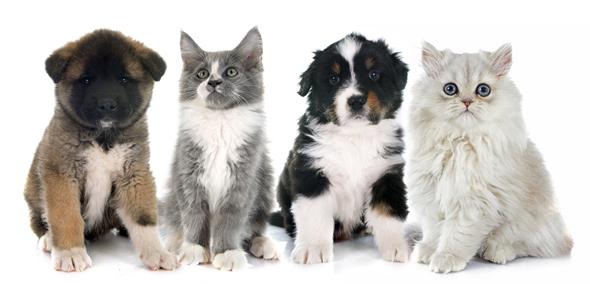Some people have pet allergies or really hate dogs, but in general nothing sounds better to stressed-out students or office workers than some playtime with puppies or kittens. So calming, so adorable. Hangouts with visiting dogs and cats have become increasingly popular in the United States, and while the benefits to humans seem clear, you might start to wonder how the pets are feeling about it. It’s actually a controversial question.
You may have noticed that Thursday was National Cat Day.
To celebrate, ridesharing company Uber held the third years of its UberKITTENS promotion, where you can request that the company bring a batch of kittens to your office for 15 minutes. The first UberKITTENS was in three North American cities. The second was in seven. This year the event was held in 55. National Cat Day is scaling up.
Uber partners with local no-kill shelters in each city (they worked nationally with the American Society for the Prevention of Cruelty to Animals for the first two years of the program) to promote adoption and help socialize the kittens. The company has also run some UberPUPPIES events. Uber calls ahead to vet the locations it is bringing animals to and always has two representatives at each office the pets visit—one from the local shelter and one from Uber itself. “We make sure that the environment is safe,” said Uber spokesperson Sarah Maxwell from inside one of the cat cars on Thursday. “The kittens really love it, they’re having lots of fun.”
The trend has caught on in schools around the United States as well. Many colleges and universities bring pets to campus to help students de-stress during exams. These animals are often trained therapy dogs, and some schools even house therapy dogs on campus all year.
There are also regional programs like the Humane Society of Broward County’s Snuggle Delivery service in southeast Florida. Similar to Uber’s program, Snuggle Delivery is meant to increase the visibility of adoption initiatives and raise awareness about humane society efforts. For a $500 donation, HSBC will bring puppies or kittens to your office for an hour. (Uber collects a $30 fee for 15 minutes that it donates to its local shelter partners.) Snuggle Delivery even allows for on-site adoption. “We’ll bring all the necessary paperwork with us, and the pets will be spayed/neutered prior,” Adam Goldberg, a spokesperson for HSBC, told the Huffington Post in March. UberKITTENS gives information to people interested in adoption so they can follow up with their local shelter. The company says that more than 20 kittens were adopted last year.
Emily Weiss, the ASPCA’s vice president of research and development, told Slate in a statement that “The ASPCA supports creative ways to promote and find loving homes for animals within the community. Above all, the welfare of the animals is our top priority and as long as a safe and stress-free environment is provided, these types of engagements can be an enriching activity for both humans and animals alike.”
Overseas the topic is much more controversial, though.
The United Kingdom Royal Society for the Prevention of Cruelty to Animals shared a document with Slate dedicated to its “concerns regarding fundraising and rehoming initiatives which involve cats or kittens being transported from rescue centres/shelters into different offices.” It outlines potentially stressful conditions for the animals like unfamiliar environments and inappropriate handling and points out that the events “lack of benefit to animals” and could encourage “spontaneous/impulse adoption.”
In February, the tech site shinyshiny published a piece opposing UberKITTENS in Australia. Nicky Trevorrow, the behavior manager at U.K. feline charity Cats Protection, told the site, “Raised stress levels could affect feline health, causing conditions like cystitis and a lowered immune system, increasing vulnerablility to infectious diseases. Kittens already have a weaker immune system than adult cats.”
It’s a bummer. Do we really have to feel bad about wanting lots of kittens and puppies in our offices all the time? John Bradshaw, the foundation director of the Anthrozoology Institute at the University of Bristol in England and the author of Cat Sense and Dog Sense, said that it’s positive to spread awareness about animals in need of adoption. “I’m in favor of animals in the workplace whenever possible,” he said.
He noted, though, that events at offices can set “false expectations. What most of these shelters have is lots of adult cats that nobody wants, not kittens.” He also raised concerns about potential health consquences for kittens and puppies. “The idea of using young animals who are not really adapted to this and who may find it stressful if the experience becomes overwhelming—I’m not in favor of that,” he said.
For now, these dichotomous ideologies seem to be resulting in on-location events with puppies and kittens being much more popular in the U.S. than in the U.K. It’s so easy to think they just want my love. But the concerns linger. Daniel Mills, a professor of veterinary behavioural medicine at University of Lincoln in England, quickly responded to an email about these types of events. “Is this real? Sadly I guess it might be. This sounds like a really bad idea to me. So many physical and psychological risks.”
